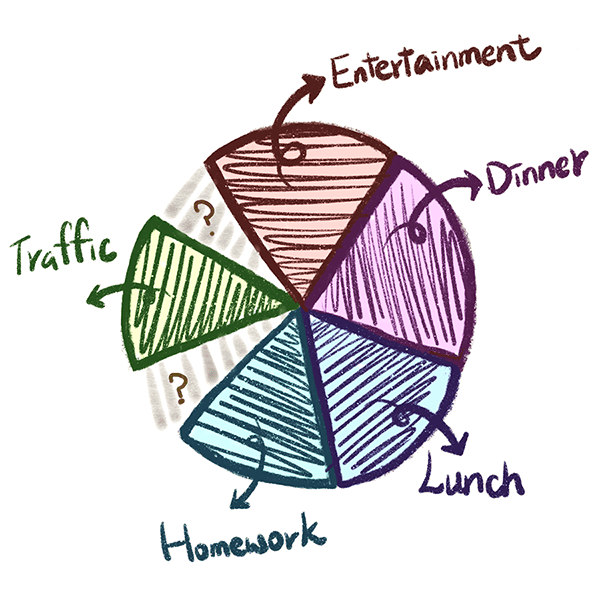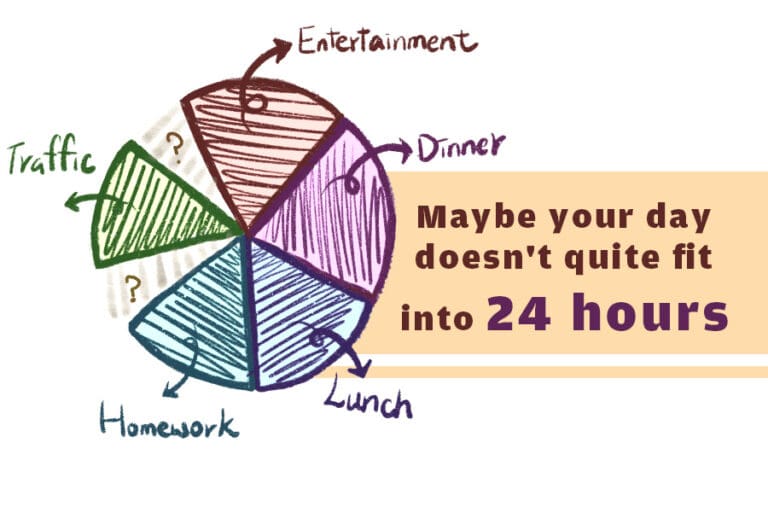Try adding up Your time in a day
Once, I asked a junior sister in my lab a crucial question: “How much time do you actually spend on reading, which includes writing papers and doing homework?”At that time we were discussing whether she could graduate on time because she was worried about not having enough time to write her thesis properly.She replied, “It should be a lot, maybe less on reading papers, but definitely more on homework. There are endless discussions and assignments every day, so it must take a considerable amount of time.”
Intrigued, I asked her to talk me through a typical day. “Go to class, finish class, do homework, eat dinner, take a shower, chat with my boyfriend, sleep…”
Essentially, she was doing everything expected of a student, yet she seemed to still struggle with managing her time. So, I probed further, “Can you break down how much time you spend on each activity?”
She detailed, “The average class ends at four o’clock. After class, I take a nap for about an hour! Then, I catch up on dramas while eating, so maybe two hours… After that, I take an hour-long bath, and spend another hour chatting with my boyfriend before going to bed… I usually go to bed after twelve o’clock.”
I pointed out that there seemed to be no time allocated for homework, and the total time seemed less than the duration between 4 pm and 12 am.She with a guilty conscience admitted, “The odd time in between is for homework…” I suggested, “Can you add each time together to see if it adds up to twenty-four hours?”

How much time have you lost?
Adding up the time of the day as an introduction to time management is a method learned in class.The professor Introducing time management as a vital skill, The professor’s conviction is clear: “Time management is as important as writing a paper!”even if the thesis is written well, there is no way to graduate on time. The professor first helps students establish time management.
Initially, the professor instructs students to list their daily activities, including sleep and meals. Subsequently, they estimate the time each activity should take, emphasizing approximation over precision. The cumulative time is then totaled. Despite variations among the students, approximately 80% fall short of reaching the 24-hour mark.

The question arises: where are those missing hours?
Upon recalculating, some successfully reach 24 hours, while others still fall short. The pondering question remains: What is occupying their lost time?
While the professor may not be a master of time management, his commitment to self-discipline is evident. He meticulously outlines and shares his schedule, serving as both a reminder for tomorrow’s tasks and tell the friends who need to find him. He even set the alarm clock on his mobile phone to every hour to remind himself, even clearly regulates the relaxation period.
You can start like this
While the professor’s day was incredibly efficient, adopting his tightly managed schedule seemed a bit too stressful for me. I decided to take his method and tailor it to my own personality by introducing a bit more flexibility.
I start by listing the tasks and scheduled meetings for the day, assigning approximate durations to each. Then, I divide the day into morning, midday, and afternoon, estimating the time available for each period.
Finally, fill in the various tasks according to the estimated duration, and it is a bit flexible. From having to have time to do it, I must complete several things in each period. This can be a bit flexible and also Can maintain the minimum amount of goals I need to achieve for the day.
The key is to maintain some flexibility while ensuring that I have allocated time for essential goals.
When I ifirst started learning into time management, rigidity was a challenge. I tended to arrange my time perfectly but lacked adaptability. Any change in the schedule would throw everything into chaos, dampening my enthusiasm. For individuals like me who can get easily frustrated with disruptions, starting with a more flexible and broad-ranging schedule is crucial.

